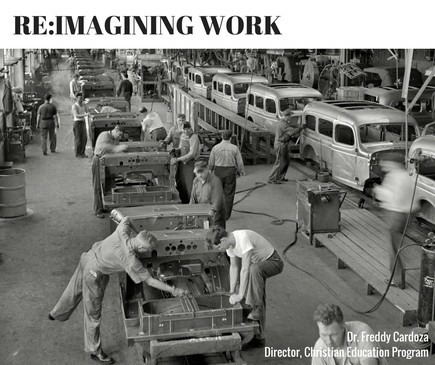
The grind of the 9 to 5 work life has perplexed many a believer who sometimes stops to wonder, “Is this all there is?”
No doubt, since the Fall of Humanity (Genesis 3), work has indeed become something altogether different than God intended prior to our expulsion from Eden. Even so, many believers may come to wrongly conclude that work is, well, just “work.” But nothing could be further from the truth.
Work matters.
Though it’s possible for us and others to reduce work to being only a “means to an end” (working for survival and providing desired pleasantries to help us and others through this world’s plight), work has both earthly and eternal ramifications.
Accepting this essential and existential value of work is necessary, because a short-sighted view of work is both inadequate for human flourishing and is, in fact, harmful.
According to Darrell Cosden in “The Heavenly Good of Earthly Work” (2006, Baker Academic), the harm of a bad theological view of work extends to individual people, society, and even the environment.
Regarding us as individuals, having a wrong perspective on what God intended for work can create certain physical, psychological, and spiritual health issues. This is certainly true for those suffering from workaholism, but it extends even to lesser degrees of wrong-headed thinking as well.
Cosden argues that society is also negatively affected due to our insufficient perspectives on work. Take, for example, the effects we have all seen work have on healthy interpersonal relationships, including familial relationships. There are also issues that can arise with work relationships, church and other organizational relationships when we can’t seem to find the proper work-life balance.
Finally, even the environment is affected, directly or indirectly, by people’s and organizations’ view of work. Considering the fact that nearly every industry uses environmental products or has some impact on our world, it makes sense that thinking biblically about the relationship between work and the environment makes sense and is, in fact, necessary. As stewards of creation, it is incumbent on us to think about these things.
As we think about practical and immediate work-related issues, it should be noted that problems with our view of work and a good work-life balance are fundamentally theological in nature. Theologically-speaking, the Fall brought destruction into the Cosmos and throughout creation, from then until now. These produced negative effects on people. People, then and now, perform work and are workers. Some of the work-related challenges we face at home, ministry, and the work-a-day world have been baked into the world system and are now a part of the fallen order.
The negative and harmful aspects of today’s workplace cannot be fixed until they undergo ultimate redemption when Christ makes all things new. Until then, we need to and, indeed, must craft a Christian vision of work. Doing so will help give us a proper perspective about the Heavenly good of earthly work— which can elevate our understanding of how God has intertwined the world, people, industry, finance, economics, and so much more, in his Divine Economy. If we are successful in integrating a solid biblical view of what work can and should be in a redeemed person’s life, individuals will flourish, believers will become greater global change agents, and God will be glorified.
 Biola University
Biola University


.jpg)
